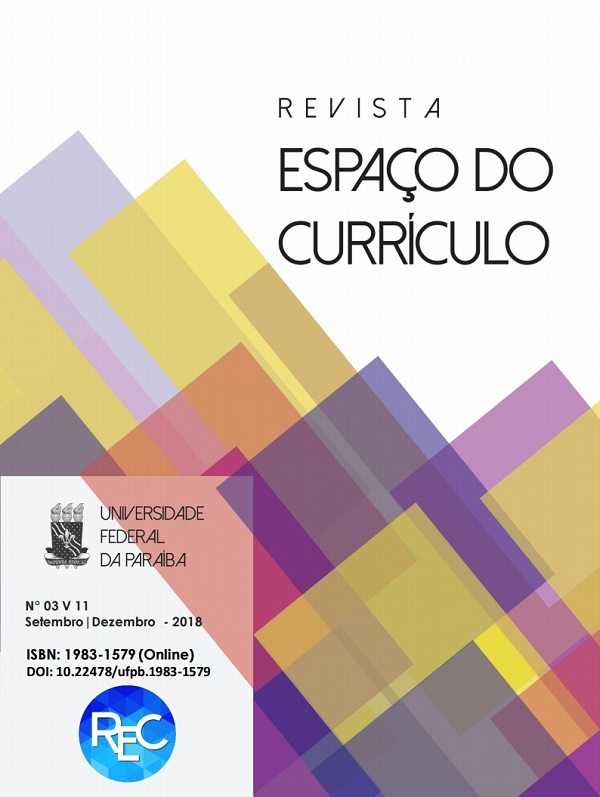BIOLOGY STUDENTS 'VIEWS ON ANIMAL AND ENVIRONMENTAL ETHICAL ISSUES
DOI:
https://doi.org/10.22478/ufpb.1983-1579.2018v3n11.41992Keywords:
Bioethics, Biology, Environmental Ethics, Animal Ethics, Biology CurriculumAbstract
Biology is a vital area to discuss environmental and animal issues in modern society, although in its graduation there are no spaces for reflection. In the research, semi-structured interviews were carried out with undergraduate students in Biology so that they could speak openly about ethical issues that they considered problematic within their training, especially in the areas of animal and environmental issues. Their speeches were analyzed following the Perspective of the Functions to observe compromised functions and to look for ways to stimulate them. At the end we can see a high number of discussions raised by the students. Within the animal issue there is the problematic issue of animal experimentation and didactic use of animals within the university. Regarding the environmental issue, students stand out for the identity of the professional biologist strongly related to the theme and the very concept of preserving. Ways to reconnect with Bioethics and stimulate spaces for reflection are vital to create professionals properly prepared to deal with the current demands of the biologist's actions, both in knowledge and ethics.
Downloads
Metrics
References
ARAUJO, Guilherme Augusto de Domenico. Os papéis do biólogo: Reflexões sobre o imaginário da profissão biólogo. 43p. Monografia (Graduação em Ciências Biológicas) – Curso de Ciências Biológicas, Universidade Federal de Santa Catarina, Florianópolis, 2009.
BORING, Anne; OTTOBONI, Kellie; STARK, Phillip. 2016. Student evaluations of teaching (mostly) do not measure teaching effectiveness. Science Open Research
BRYANT, John; LA VELLE, Linda Baggott. A bioethics course for biology and science education students. Journal of Biological Education, Nova Iorque, v.37, n. 2, p. 91–95, 2003.
CARNEIRO, Larissa Arbués; PORTO, Celmo Celeno; DUARTE, Soraya Bianca Reis; CHAVEIRO, Neuma; BARBOSA, Maria Alves. O ensino da ética nos curso de graduação da área da saúde. Revista Brasileira de Educação Médica, Brasília, v. 34, n. 3, p. 412 – 421, 2010.
CONRADO, Dália Melissa; EL-HANI, Charbel Nino; NUNES-NETO, Nei de Freitas. Sobre a ética ambiental na formação do biólogo. REMEA - Revista Eletrônica do Mestrado de Educação Ambiental, Rio Grande, v.30, n.1: p. 120-139, 2013.
COSTA, Marco Antonio Ferreira; COSTA, Maria de Fátima Barrozo. Biossegurança em saúde no ensino de ciências. Revista Práxis, Volta Redonda, v. 9, p.11 – 15, 2013.
DeSTEFANO, Stephen & STEIDL, Robert. The professional biologist and advocacy: What role do we play? Human Dimensions of Wildlife, v.6, n.1, p. 11–19, 2000.
DIAS, Maria Clara (Org.) A Perspectiva dos Funcionamentos: Por uma abordagem moral mais inclusiva. Rio de Janeiro: Pirilampo, 2015. 228p.
DOKE, Sonali; DHAWALE, Shashikant. Alternatives to animal testing: A review. Saudi Pharmaceutical Journal,Riad, v.23, p. 223 – 229, 2015.
FONTANELLA, Bruno José Barcellos; RICAS Janete; TURATO, Egberto.Ribeiro. Amostragem por saturação em pesquisas qualitativas em saúde: contribuições teóricas. Caderno de Saúde Pública, Rio de Janeiro, v.24, n.1, p. 17-27, 2008.
GRUNSPAN, Daniel; EDDY Sarah; BROWNELL, Sara; WIGGINS, Benjamim; CROWE, Allison; GOODREAU, Stephen. Males Under-Estimate Academic Performance of Their Female Peers in Undergraduate Biology Classrooms. Plos ONE, v.11, n.2, doi:10.1371/journalpone.0148405, 2016.
HART, Stuart. A riqueza na pobreza. Revista Ídeia Sustentável. Disponível em: http://www.ideiasustentavel.com.br/2013/02/entrevista-stuart-hart. Acesso em: 15 de Setembro de 2018..
KOLAROVA, Teodora Aleksandrova; DENEV, Ilya Dimitrov. Integrating a Bioethics Course Into Undergraduate Biology Education. Biotechnology & Biotechnological Equipment, Nova Iorque, v.26, n.1, p. 2801 – 2810, 2012.
KOHLBERG, Elizabeth. A Sexta Extinção - Uma História Não Natural. Rio de Janeiro: Intrínseca, 2015. 336p.
LOPES, Lucas Nascimento Ferreira. Bioética e Biologia: Visões e questões éticas dos estudantes de Graduação. 112p. Dissertação (Mestrado em Bioética, Ética Aplicada e Saúde Coletiva) – PPGBIOS, Universidade Federal Fluminense, Rio de Janeiro, 2017.
PESSINI, Leo. As origens da bioética: do credo bioético de Potter ao imperativo bioético de Fritz Jahr. Revista Bioética, Brasília, v.21, n.1, p. 9-19, 2013.
PHILLIPS, Clive. The welfare of animals: the silent majority. Amsterdam: Springer, 2009. 220 p.
PINTO, Gabriela Bertti da Rocha. A ausência da ética animal nas disciplinas de Bioética nos currículos do curso de Ciências Biológicas no Brasil. 94p. Dissertação (Mestrado em Bioética, Ética Aplicada e Saúde Coletiva) – PPGBIOS, Universidade Federal Fluminense, Niterói, 2016.
POTTER, Van Rensselaer. Bioética: Ponte para o futuro. São Paulo: Loyola, 2016. 208p.
ONU.O Futuro que queremos - Declaração final da Conferência das Nações Unidas sobre Desenvolvimento Sustentável. 2012. Disponível em <http://www.mma.gov.br/port/conama/processos/61AA3835/O-Futuro-que-queremos1.pdf> . Acesso em 15 de Setembro de 2018.
RAVEENDRAN Ramasamy; BATMANABE Gitanjali. Alternatives to animals in teaching: Experience in an Indian medical school. Proceedings of the ALTEX 8th World Congress, Montreal, v.1, n.12, p. 355 – 360, 2011.
SAPP, Jan. Genesis: The Evolution of Biology. Oxford: Oxford University Press, 2003. 364p.
SATHYANARAYANA, Mukkura. Need for Alternatives for Animals in Education and Alternative Resources. Procedings of Animal Alternatives in Teaching, Toxicity, Testing and Medicine, v.1, n.13, p. 77 – 81, 2009.
SILVA, Tomaz Tadeu. Teoria cultural e educação: um vocabulário crítico. Belo Horizonte: Autêntica, 2000. 127p.
TAYLOR, Nik.; SIGNAL, Tania. Empathy and atitudes to animals. Anthrozoös. v.18, n.1, p. 18 – 27, 2005.
TEIXEIRA, Michelle Cecille Bandeira; DIAS, Maria Clara; RIBEIRO, Carlos Dimas Martins. A perspectiva dos funcionamentos para a educação superior em saúde, p. 155-178. In: DIAS, Maria Clara (org). A Perspectiva dos Funcionamentos. Rio de Janeiro: Pirilampo, 2015. 228p.
Downloads
Additional Files
Published
How to Cite
Issue
Section
License
By submitting an article to Curriculum Space Journal (CSJ) and having it approved, the authors agree to assign, without remuneration, the following rights to Curriculum Space Journal: first publication rights and permission for CSJ to redistribute this article. article and its metadata to the indexing and reference services that its editors deem appropriate.
















